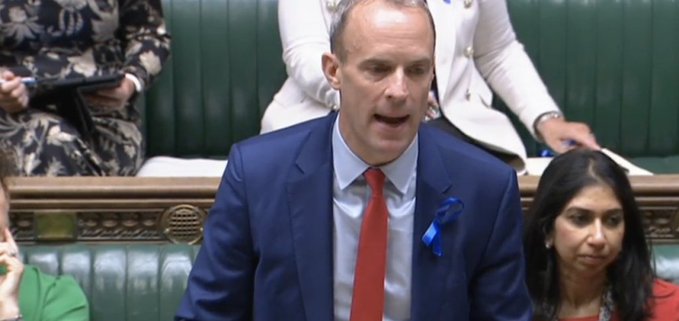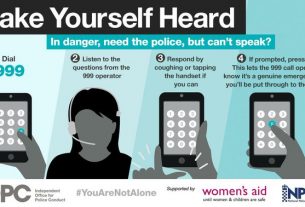On Wednesday, Justice Secretary and Deputy Prime Minister, Dominic Raab introduced the much-anticipated Bill of Rights in Parliament. The Tory party had promised back in 2007 under David Cameron to replace Labour’s Human Rights Act. With the proposed legislation the government is seeking to curb the influence of the European Court of Human Rights (ECHR). Only last week, the ECHR prevented the departure of the first flight to send migrants to Rwanda. The Bill of Rights would allow British courts to diverge from ECHR case law. Dominic Raab said that the new legislation would “restore a healthy dose of common sense”. Once passed the legislation would make the London Supreme Court the ultimate authority on human rights in Britain.
The Bill also cracks down on human rights violation claims criminals have been using to avoid prosecution. In addition, the proposed legislation would eliminate some of the European-style privacy laws.
The Labour party, alongside several NGOs and human rights lawyers’ associations, has condemned the removal of the Human Rights Act as a “very dark day for victims of crime, for women, for people in care” and “for everyone in this country who rely on the state to protect them from harm”.
Bill of Rights – what’s included
In the making since 2007, the Tory party’s Bill of Rights has finally seen the light of day. Apart from enabling British courts to veer away from European Court for Human Rights case law, the proposed legislation introduces a plethora of new rules. The new rules are to strengthen freedom of speech while awarding elected lawmakers greater power.
Under the proposed legislation, human rights claims will only go to court if claimants can show that they have suffered compelling disadvantages.
Deportations are also set to be streamlined. Foreign criminals will newly have to prove that “a child or dependent would come to overwhelming, unavoidable harm if they were deported”. Thus, the right to family life will no longer trump public safety in deportation cases.
Other measures include:
- Jury trials are to be recognized as a “fundamental component of fair trials”.
- The government can proceed with the establishment of more Separation centres and offenders will no longer be able to claim “a right to socialise”.
- Courts will no longer be able to force the police to “actively protect someone’s human rights”.
- The introduction of “a stronger test for courts to consider before they can order journalists to disclose their sources”.
Deputy Prime Minister, Lord Chancellor and Secretary of State for Justice, Dominic Raab said:
“The Bill of Rights will strengthen our UK tradition of freedom whilst injecting a healthy dose of common sense into the system.
“These reforms will reinforce freedom of speech, enable us to deport more foreign offenders and better protect the public from dangerous criminals.”
Labour brands bill publication as a “very dark day”
In response to the Deputy Prime Minister’s speech, Ellie Reeves, the shadow justice minister said:
“For members of the party of Churchill, who inspired the European Convention of Human Rights, to want to do away with it altogether, is really quite something.
“I gather that he (Mr Raab) doesn’t want to withdraw from the European Convention, not least because he knows it would fatally undermine the Good Friday Agreement and peace in Northern Ireland.
She went on to condemn the government’s “pitiful progress” regarding rape convictions.
“This Bill of Rights isn’t just an attack on victims of crime who the state has failed to protect”, adding “it’s an attack on women.
“Women have used the Human Rights Act to challenge the police when they have either failed or refused to investigate rape and sexual assault cases.”
Human rights groups condemn Bill of Rights
In the aftermath of Dominic Raab’s speech, human rights NGOs came out in force against the proposed legislation.
Amnesty International UK Chief Executive, Sacha Deshmukh condemned the removal of the Human Rights Act:
“From the Hillsborough disaster to the right to a proper Covid inquiry, to the right to challenge the way police investigate endemic violence against women, the Human Rights Act is the cornerstone of people power in this country. It’s no coincidence that the very politicians it holds to account want to see it fatally weakened.”
Liberty campaign officer, Jun Pang said:
“This is the latest example, but there’s countless examples of the government clamping down on people’s rights, whether on the streets, in the courts, at the ballot box or in parliament.
“The bill of rights will result in everyone’s rights being eroded and everyone’s protections being reduced but obviously with the most disproportionate effects on already marginalised communities.”
In a press release, the Law Society UK quoted its president, Stephanie Boyce:
“The erosion of accountability trumpeted by the justice secretary signals a deepening of the government’s disregard for the checks and balances that underpin the rule of law.”
On Twitter, sentiments on the bill were equally negative.
British government Bill of Rights represents ‘power grab on an epic scale’ says Human Rights Consortium @NUJofficial @NUJBelfast @NIC_ICTU @AmnestyNI @CAJNi @FinucaneCentre pic.twitter.com/79gImUnu1N
— Kevin Cooper (@photolinepic) June 23, 2022




